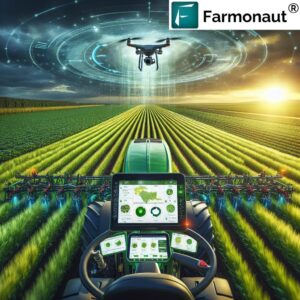Revolutionizing UK Agriculture: How Precision Farming and GPS Technology Are Boosting Crop Yields and Sustainability
“Precision farming techniques can increase crop yields by up to 30% while reducing water usage by 20-50%.”
Welcome to Farmonaut’s comprehensive guide on the latest innovations in sustainable agriculture and precision farming technologies. As we navigate through the ever-evolving landscape of modern farming practices, we’ll explore how cutting-edge crop management solutions and agricultural GPS technology are empowering farmers across the UK to optimize soil health and boost crop production efficiency.
In this blog post, we’ll delve into the world of agricultural innovation, covering topics such as conservation agriculture, agronomy advancements, and the integration of tractors with GPS for improved efficiency. Whether you’re interested in cereals, root vegetables, or diversification strategies, we’ve got you covered. So, let’s dive in and discover how precision farming and GPS technology are revolutionizing UK agriculture!
The Rise of Precision Farming in the UK
Precision farming, also known as precision agriculture, is transforming the way British farmers manage their land and crops. This approach uses advanced technologies to optimize resource use, increase yields, and reduce environmental impact. Here’s how precision farming is making waves in the UK:
- Satellite-based crop monitoring: Farmers can now track crop health and growth patterns using satellite imagery, allowing for early detection of issues and targeted interventions.
- GPS-guided machinery: Tractors and other farm equipment equipped with GPS technology can operate with centimeter-level accuracy, reducing overlap and improving efficiency.
- Variable rate technology (VRT): This allows for precise application of inputs like fertilizers and pesticides based on specific field conditions, minimizing waste and environmental impact.
- Soil mapping: Detailed soil analysis helps farmers understand the variability within their fields, enabling them to tailor their management practices accordingly.
At Farmonaut, we’re proud to be at the forefront of this agricultural revolution, offering advanced satellite-based farm management solutions that make precision agriculture affordable and accessible to farmers across the UK.

GPS Technology: A Game-Changer for UK Farmers
GPS technology has become an indispensable tool for modern farmers, revolutionizing various aspects of agricultural operations. Here’s how GPS is boosting efficiency and productivity in UK farming:
- Accurate field mapping: GPS allows farmers to create precise field boundaries and identify areas that require specific attention.
- Auto-steering systems: Tractors equipped with GPS auto-steering can maintain straight lines with minimal overlap, reducing fuel consumption and operator fatigue.
- Precision planting and harvesting: GPS-guided planters and harvesters ensure optimal spacing and reduce crop losses during harvesting.
- Yield mapping: Combine harvesters with GPS and yield monitors can create detailed maps of crop productivity, helping farmers identify areas for improvement.
“GPS-guided tractors can improve field efficiency by 10-15%, saving farmers time and fuel costs.”
To experience the benefits of GPS technology in agriculture firsthand, check out Farmonaut’s innovative solutions:
For developers interested in integrating our satellite and weather data into their own systems, explore our API and API Developer Docs.
Sustainable Agriculture Practices in the UK
As the UK agricultural sector faces increasing pressure to reduce its environmental footprint, sustainable farming practices are gaining traction. Here are some key sustainable agriculture techniques being adopted by UK farmers:
- Conservation tillage: Minimizing soil disturbance to improve soil health and reduce erosion.
- Cover cropping: Planting cover crops between main crop seasons to protect and enrich the soil.
- Integrated pest management (IPM): Using a combination of biological, cultural, and chemical methods to control pests while minimizing environmental impact.
- Precision irrigation: Employing smart irrigation systems to optimize water use based on crop needs and soil moisture levels.
- Agroforestry: Integrating trees and shrubs into agricultural systems to improve biodiversity and soil health.
These sustainable practices not only benefit the environment but also contribute to long-term farm productivity and profitability.

Crop Management Solutions for UK Farmers
Effective crop management is crucial for maximizing yields and ensuring sustainable production. Here are some innovative crop management solutions gaining popularity among UK farmers:
- Remote sensing: Using satellite and drone imagery to monitor crop health and detect issues early.
- Precision nutrient management: Applying fertilizers based on specific crop needs and soil conditions to optimize nutrient use efficiency.
- Crop rotation: Implementing diverse crop rotations to improve soil health and break pest and disease cycles.
- Decision support systems: Utilizing data-driven tools to help farmers make informed decisions about planting, irrigation, and harvesting.
Farmonaut’s satellite-based crop health monitoring system is an excellent example of how technology can support effective crop management. Our platform provides real-time insights into vegetation health, soil moisture levels, and other critical metrics, enabling farmers to make data-driven decisions.
Soil Health Optimization: The Foundation of Sustainable Farming
Healthy soils are the cornerstone of productive and sustainable agriculture. UK farmers are increasingly focusing on soil health optimization through various techniques:
- Reduced tillage: Minimizing soil disturbance to preserve soil structure and organic matter.
- Organic matter management: Incorporating crop residues and organic amendments to improve soil fertility and water retention.
- Soil testing and mapping: Regular soil analysis to guide nutrient management and identify areas requiring specific interventions.
- Biochar application: Using biochar to enhance soil carbon sequestration and improve soil structure.
- Precision liming: Applying lime in variable rates based on soil pH maps to optimize soil acidity levels.
By focusing on soil health, farmers can improve crop resilience, reduce input costs, and contribute to long-term sustainability.
Smart Irrigation Systems: Optimizing Water Use in UK Agriculture
Water management is a critical aspect of sustainable farming, especially in regions facing water scarcity or unpredictable rainfall patterns. Smart irrigation systems are helping UK farmers optimize water use and improve crop productivity:
- Soil moisture sensors: These devices provide real-time data on soil moisture levels, allowing for precise irrigation scheduling.
- Weather-based irrigation controllers: These systems adjust irrigation based on local weather conditions and forecasts.
- Drip irrigation: This efficient method delivers water directly to plant roots, minimizing evaporation and runoff.
- Variable rate irrigation: Using GPS and field mapping to apply water at variable rates across different parts of a field based on specific needs.
Farmonaut’s platform integrates with various smart irrigation systems, providing farmers with valuable insights to optimize their water management strategies.
Regenerative Farming Practices in the UK
Regenerative agriculture is gaining momentum in the UK as farmers seek to not only sustain but improve their land’s productivity and ecological health. Key regenerative farming practices include:
- No-till farming: Eliminating tillage to preserve soil structure and increase organic matter.
- Diverse crop rotations: Implementing complex rotations to enhance soil health and break pest cycles.
- Livestock integration: Incorporating grazing animals into crop systems to improve nutrient cycling and soil health.
- Permanent soil cover: Maintaining living roots in the soil year-round through cover cropping and intercropping.
- Agroecological approaches: Enhancing on-farm biodiversity to promote natural pest control and pollination.
These practices not only improve soil health and crop resilience but also contribute to carbon sequestration and biodiversity conservation.
Diversification Strategies for UK Farmers
Diversification is becoming increasingly important for UK farmers looking to reduce risk and increase income streams. Some popular diversification strategies include:
- Crop diversification: Growing a wider range of crops to spread risk and take advantage of different market opportunities.
- Agritourism: Offering farm stays, tours, or educational experiences to generate additional income.
- Value-added products: Processing farm products to create higher-value goods, such as cheese, jams, or craft beverages.
- Renewable energy production: Installing solar panels or wind turbines on farmland to generate electricity.
- Contract services: Offering specialized services to other farmers, such as custom harvesting or spraying.
Diversification can help farmers build resilience against market fluctuations and climate-related risks.
Navigating Farm Grants and Compliance in the UK
UK farmers have access to various grants and support schemes to help them adopt sustainable practices and improve their operations. However, navigating these opportunities can be complex. Here are some key points to consider:
- Environmental Land Management scheme (ELM): This new scheme rewards farmers for environmental improvements and sustainable land management.
- Countryside Stewardship: Provides financial incentives for farmers and land managers to look after and improve the environment.
- Farming Investment Fund: Offers grants to improve farm productivity and environmental sustainability.
- Compliance requirements: Farmers must adhere to various regulations, including cross-compliance rules for receiving direct payments.
Farmonaut’s platform can help farmers track and document their sustainable practices, supporting grant applications and compliance efforts.
Overcoming Weather Challenges in UK Agriculture
Weather variability is a significant challenge for UK farmers. Here are some strategies to mitigate weather-related risks:
- Climate-smart agriculture: Adopting practices that increase resilience to climate change, such as drought-tolerant crop varieties.
- Weather forecasting tools: Using advanced weather prediction models to inform farm management decisions.
- Crop insurance: Protecting against crop losses due to adverse weather conditions.
- Controlled environment agriculture: Investing in greenhouses or polytunnels to reduce weather-related risks for high-value crops.
Farmonaut’s platform integrates weather data and forecasts, helping farmers make informed decisions based on current and predicted conditions.
The Future of UK Agriculture: Trends and Innovations
As we look to the future, several trends and innovations are shaping the landscape of UK agriculture:
- Artificial Intelligence (AI) in farming: AI-powered systems for crop monitoring, pest detection, and yield prediction.
- Vertical farming: High-tech indoor farming systems for year-round production of fresh produce.
- Robotics and automation: Development of autonomous tractors, harvesters, and other farm machinery.
- Gene editing: Potential applications of CRISPR and other gene-editing technologies to develop resilient crop varieties.
- Blockchain in agriculture: Improving traceability and transparency in the food supply chain.
These innovations promise to further revolutionize UK agriculture, improving efficiency, sustainability, and food security.
Comparison of Traditional vs. Precision Farming Techniques
| Farming Aspect | Traditional Method | Precision Farming Method | Benefits of Precision Farming |
|---|---|---|---|
| Crop Monitoring | Visual inspection | Satellite imagery and remote sensing | Early detection of crop stress, targeted interventions |
| Irrigation | Uniform application | Variable rate irrigation based on soil moisture sensors | Water conservation, improved crop health |
| Fertilizer Application | Blanket application | Variable rate application based on soil maps | Reduced input costs, minimized environmental impact |
| Yield Management | Whole-field averages | GPS-enabled yield mapping | Identification of high and low-performing areas, targeted improvements |
| Planting | Fixed-rate seeding | Variable-rate seeding based on field conditions | Optimized plant population, improved yield potential |
Conclusion: Embracing the Future of UK Agriculture
As we’ve explored in this comprehensive guide, precision farming and GPS technology are truly revolutionizing UK agriculture. From boosting crop yields to enhancing sustainability, these innovations are helping farmers overcome challenges and build a more resilient agricultural sector.
At Farmonaut, we’re committed to making these advanced technologies accessible to farmers of all scales. Our satellite-based farm management solutions provide valuable insights that empower farmers to make data-driven decisions, optimize resource use, and improve their bottom line.
As we look to the future, it’s clear that embracing these innovative practices and technologies will be crucial for the success and sustainability of UK agriculture. By combining traditional farming wisdom with cutting-edge solutions, we can create a more productive, efficient, and environmentally friendly agricultural sector that will continue to thrive for generations to come.
FAQ Section
Q: What is precision farming?
A: Precision farming is an approach that uses advanced technologies like GPS, satellite imagery, and sensors to optimize agricultural practices, improve efficiency, and increase crop yields while minimizing environmental impact.
Q: How does GPS technology benefit farmers?
A: GPS technology helps farmers with accurate field mapping, auto-steering of tractors, precision planting and harvesting, and detailed yield mapping, leading to improved efficiency and reduced input costs.
Q: What are some key sustainable agriculture practices?
A: Key sustainable practices include conservation tillage, cover cropping, integrated pest management, precision irrigation, and agroforestry.
Q: How can farmers optimize soil health?
A: Farmers can optimize soil health through reduced tillage, organic matter management, regular soil testing and mapping, biochar application, and precision liming.
Q: What are smart irrigation systems?
A: Smart irrigation systems use technologies like soil moisture sensors, weather-based controllers, and variable rate application to optimize water use in agriculture.
Q: How can UK farmers access grants for sustainable farming?
A: UK farmers can access grants through schemes like the Environmental Land Management scheme (ELM), Countryside Stewardship, and the Farming Investment Fund.













